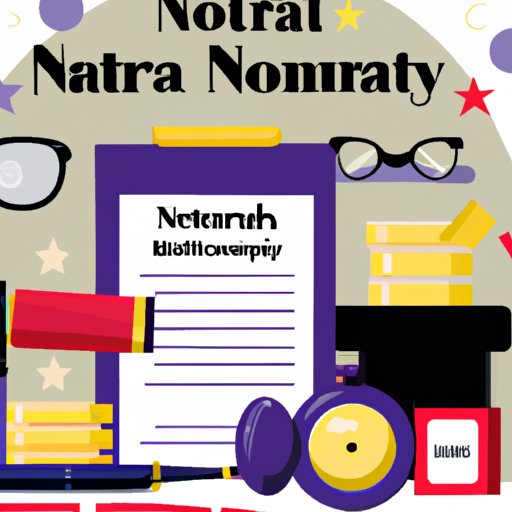Introduction
Starting your own notary business is a great way to make a living while providing an invaluable service to individuals, businesses, and organizations. As a notary, you will be responsible for verifying documents, witnessing signatures, and performing other services related to legal proceedings. In order to get your business off the ground, there are a few steps you need to take. This article will provide a comprehensive guide on how to start your own notary business.
What is a Notary Business?
A notary business is a service that verifies documents and witnesses signatures in order to authenticate legal proceedings. Notaries are also commonly referred to as notary publics. They are required by law to be impartial third parties who witness legal documents and verify the identity of those signing documents.
Why Start a Notary Business?
Starting a notary business is a great way to earn a living while providing an important service to individuals, businesses, and organizations. Notaries are often called upon to witness signatures for a wide range of documents, such as loan applications, contracts, wills, deeds, and more. Additionally, many states require that certain documents be notarized in order for them to have legal standing. As a notary, you can choose to work independently or hire other notaries to join your business. There is a great deal of potential for growth in the notary business, so it’s a great option for entrepreneurs looking to start their own business.
Research Your State’s Notary Laws and Requirements
Before you start your notary business, it’s important to familiarize yourself with your state’s laws and requirements. Each state has different laws regarding notaries, so it’s important to research your specific state’s requirements. Generally speaking, you will need to understand the scope of the notary’s authority, determine any licensing or bonding requirements, and become familiar with the fees associated with notarizing documents.
Understand the Scope of the Notary’s Authority
It’s important to understand the limitations of a notary’s authority. Notaries cannot offer legal advice, draft legal documents, or give opinions regarding the legality of documents. Additionally, notaries cannot witness signatures for documents that are not allowed by law. It’s important to understand the scope of the notary’s authority before starting your business.
Determine Any Licensing or Bonding Requirements
In addition to understanding the scope of the notary’s authority, you will also need to determine whether or not your state requires licensing or bonding. Most states require that notaries obtain a license in order to practice, and some states may require that notaries obtain a surety bond. It’s important to research your state’s requirements before starting your business.

Familiarize Yourself with Notary Fees
Notaries typically charge fees for their services. The amount charged varies from state to state, and it’s important to research the fees associated with notarizing documents in your state. Knowing the fees ahead of time will help you set up your pricing structure and ensure that you are charging a fair price for your services.

Obtain Necessary Training and Certification
In most states, notaries are required to complete a training course and pass an exam in order to become certified. The course typically covers topics such as the duties of a notary, laws and regulations, and ethical practices. Once you have completed the course and passed the exam, you will receive your certification and be able to start your business.
Invest in Essential Notary Supplies
In order to run a successful notary business, you will need to invest in essential notary supplies. These include a notary seal, a notary journal, and other essential supplies. A notary seal is used to stamp documents and validate them as legally binding. A notary journal is used to record all notarial acts, and it is required by some states. Other essential supplies include rubber stamps, embossers, and ink pads.

Develop a Business Plan for Your Notary Business
Once you have obtained the necessary training and supplies, it’s time to develop a business plan for your notary business. A business plan should include an effective business model, established goals, and a budget. An effective business model will help you determine the best way to market your business, establish your pricing structure, and identify potential clients. Established goals will help you stay focused and motivated, and a budget will help you manage your finances.
Market Your Notary Business to Potential Clients
The next step is to market your notary business to potential clients. Identifying your target audience is key to success. You should focus your efforts on individuals and businesses that are likely to need your services. Once you’ve identified your target audience, you can use traditional and digital marketing strategies to reach them. You can also leverage word of mouth advertising by networking with other professionals and offering discounts or incentives to existing clients.
Conclusion
Starting a notary business is a great way to make a living while providing an invaluable service to individuals, businesses, and organizations. In order to get your business off the ground, you need to research your state’s laws and requirements, obtain the necessary training and certification, invest in essential notary supplies, develop a business plan, and market your business to potential clients. By following these steps, you can launch your notary business and start providing your services.
The benefits of starting your own notary business are numerous. Not only will you be able to make a living while providing an important service, but you will also have the freedom to be your own boss and set your own hours. With the right approach, you can build a successful business that will serve the needs of your clients for years to come.
(Note: Is this article not meeting your expectations? Do you have knowledge or insights to share? Unlock new opportunities and expand your reach by joining our authors team. Click Registration to join us and share your expertise with our readers.)
